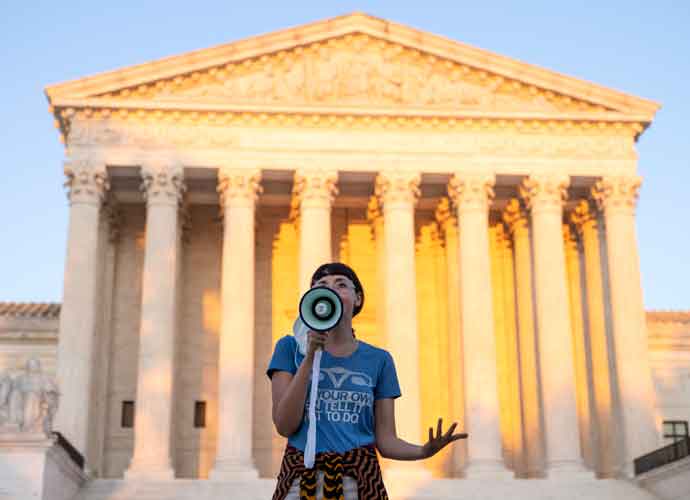

WASHINGTON, DC - SEPTEMBER 02: An activist, who declined to provide her name, speaks outside the Supreme Court in protest against the new Texas abortion law that prohibits the procedure around six weeks into a pregnancy on September 2, 2021 in Washington, DC. The Supreme Court declined to block the law and will let the legal battle play out in the lower courts. (Photo by Drew Angerer/Getty Images)
Last week, the Supreme Court ruled in favor of the Consumer Financial Protection Bureau, affirming that its special funding structure remains within the bounds of the Constitution’s Appropriations Clause despite claims from payday lending groups.
Payday lending groups brought many claims to the lower courts, most of which failed. They argued that the Bureau’s unique funding structure, which comes from the joint earnings of the Federal Reserve System rather than annual appropriations, impedes Congressional financial power.
The payday lending industry argued that this structure, created to protect the Bureau’s autonomy from the influence of whichever party held power in Congress, jeopardizes consumer-friendly banking relations.
Specifically, the industry sued the Bureau over a 2017 law that prohibits efforts to withdraw payments from accounts after two consecutive failed attempts due to insufficient funds.
Subscribe to our free weekly newsletter!
A week of political news in your in-box.
We find the news you need to know, so you don't have to.
Under this law, multiple withdrawal attempts can result in borrowers incurring additional banking fees. The payday lending groups claimed this was unconstitutional and an impediment to Congressional financial power.
Although most of their claims were unsuccessful in the lower courts, the 5th U.S. Circuit of Appeals in New Orleans found that the Bureau’s funding contradicted the founding principle affirming Congress’s exclusive authority over the nation’s finances.
In 2022, the Biden administration appealed this decision to the Supreme Court, arguing that invalidating the Bureau’s funding would devastate popular regulations on mortgages, car loans and credit cards.
Justice Clarence Thomas wrote the majority opinion for a 7-2 court, saying, “Although there may be other constitutional checks on Congress’ authority to create and fund an administrative agency, specifying the source and purpose is all the control the Appropriation Clause requires.”
Justice Samuel Alito joined Justice Neil Gorsuch in dissent and argued that the majority’s opinion granted the Bureau far too much leeway.
“In sum, CFPB’s unprecedented combination of funding features affords it the very kind of financial independence that the Appropriations Clause was designed to prevent,” wrote Alito.
He added, “It is not an exaggeration to say that the CFPB enjoys a degree of financial autonomy that a Stuart king would envy.”
While the ruling is a significant win for the Biden administration, opponents argue that it also exemplifies the Supreme Court’s failure to endorse controversial opinions from the 5th Circuit.
Sen. Mitch McConnell (R-Kentucky) is facing criticism for comments made in a meeting with members…
Karine Jean-Pierre, former White House press secretary during Joe Biden's term in office, announced that…
Gov. Kathy Hochul (D-New York) announced plans to build a nuclear power plant in upstate…
Tesla CEO Elon Musk, a former top deputy for President Donald Trump, called the Republican…
The Supreme Court ruled in favor of South Carolina's decision to stop covering Planned Parenthood's…
A federal judge ruled on June 24 that the Trump administration cannot eliminate union bargaining…